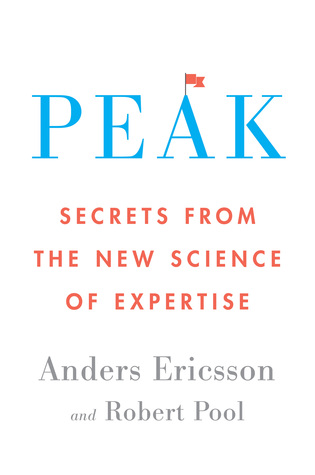I first heard about this book from the Freakonomics podcast (they had a self-improvement month), and apparently, he's the guy whose research Malcolm Gladwell drew on to create the 10,000-hour rule. He says that Gladwell isn't all that correct (though he isn't completely wrong).
This book focuses on one thing: how do people become experts? Hearteningly, "innate talent" does not seem to be the determining factor.
According to Andersson's research, humans are extremely adaptable people. However, most of us settle for "good enough" (nothing wrong with that, by the way), and assume that once we hit a plateau, we've reached the limits of our innate ability.
That's not quite true. Through deliberate practice (and lots of time), we too can become experts.
By the way, there are two types of practice mentioned in the book: purposeful and deliberate. Both are good, and purposeful practice will definitely help you improve much more than naive practice (which is what most of us do), but deliberate is better.
But just because, purposeful practice:
1. Has well-defined, specific goals: you aren't just "playing the song", you are "playing the song while making sure that I don't make XYZ mistake"
2. Involves feedback: if you made a mistake, someone tells you.
3. Requires getting out of one's comfort zone: growth happens when you're stretching yourself.
Now on to deliberate practice, which is more complicated:
1. Deliberate practice develops skills that other people have already figured out how to do and for which effective training techniques that have already been established
2. Takes place outside one's comfort zone
3. Involves well-defined, specific goals and often involves improving some aspect of target performance (not overall)
4. It requires your full attention and conscious actions.
5. Involves feedback and modification of actions in response to feedback:
6. Deliberate practice both produces and depends on effective mental representations. Basically, you're using your long term memory for things.
So it's obvious that deliberate practice is more involved that purposeful practice. And thinking back, this all does make sense.
My golf never got better when I was just hitting balls. But when I was focused on my form, it got way better (and I didn't lose as much 'skill' after a long hiatus, though obviously I didn't get better). I haven't, however, added specific goals to the practice, so that's something I can do, even at the range.
I highly recommend reading the whole book, because he talks about deliberate practice on the job and in everyday life. Plus, it's an accessible book.
One last thing: it's easier to do deliberate practice in certain fields (e.g. Violin, piano, golf, chess) because there is a standard that can be used as a judge. But it's applicable to skills in general.
I may have borrowed this from the library, but I'm seriously considering buying my own copy because I think that I will want to reread this, and try and figure out how I can use deliberate practice to get better.
Monday, September 19, 2016
Subscribe to:
Post Comments
(
Atom
)


No comments :
Post a Comment
I really do appreciate all comments, and I'll try my best to reply within 24 hours!
^_^